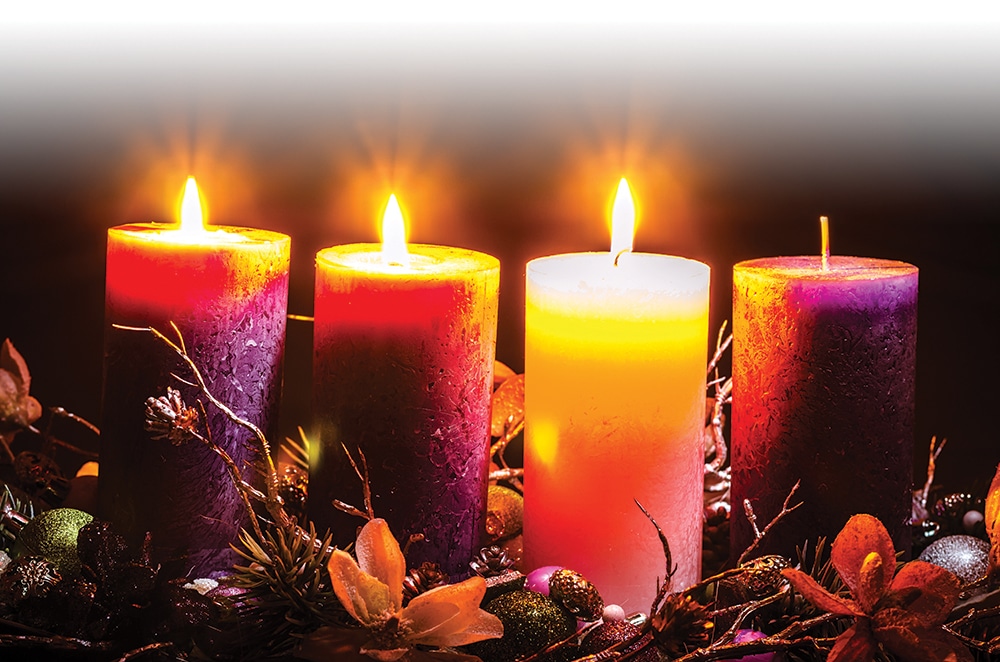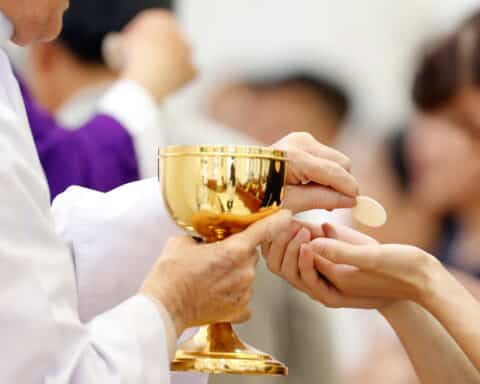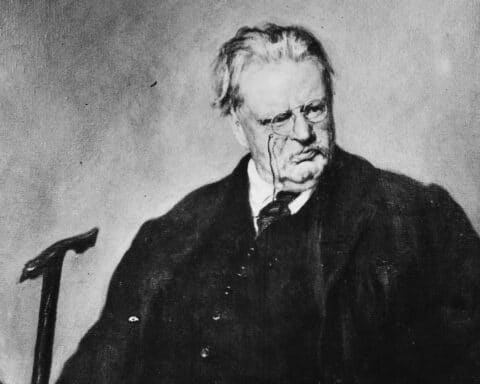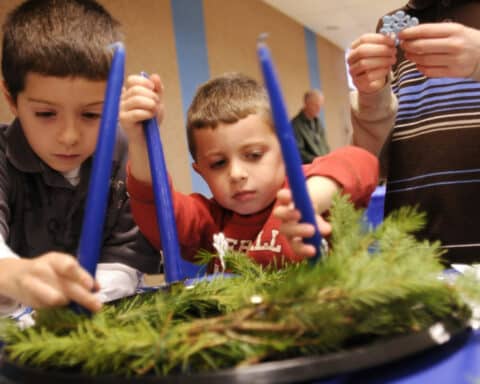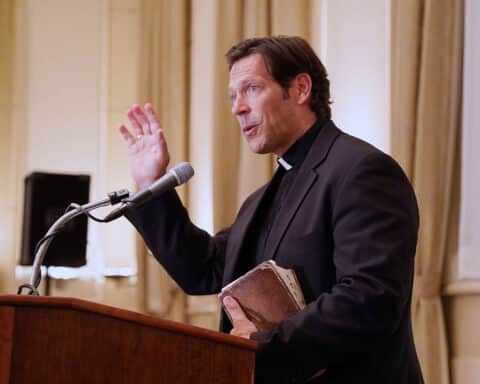On May 22, Brother Joseph Michael Fino of the Franciscan Friars of the Renewal was ordained into the transitional diaconate with three of his fellow friars. Brother Fino said he wasn’t even sure if the ordination was going to happen — the churches in New York City hadn’t opened their doors for a Mass in more than two months.
But Bishop Peter Byrne of New York agreed to ordain them, in a 10-person ceremony Brother Joseph called “clandestine.”
While he was driving from his friary in Yonkers to the chapel in the Bronx, Brother Fino suddenly needed to call his family. “I just felt, ‘This is really important,'” he said. Even as it was about to pass by, the moment demanded commemoration — a gathering, if only via phone. Brother Fino called his sister and his parents, who were getting ready to tune into the ceremony via livestream.
“They didn’t answer their phones,” he said with a chuckle, “but I just left a message on their voicemail saying, ‘I’m going now. It’s kind of weird not having you guys here.'”
No event but thoughts
“There are no events but thoughts,” writes author Annie Dillard in “Holy the Firm.” And how true Dillard’s words rang this year. The year 2020 ushered in the advent of the “save a new date” card as ordinations, weddings and reunions were all rebooked. Events were suspended indefinitely. And in the absence of events — large dinner parties, crowded cocktail receptions or wedding dance floors — we have been left with the humdrum of routine.
Our lives need events. The rhythm of life demands the interruption of the ordinary. These celebrations break through our daily lives to shout: “This is important! Something has happened.”
In a way, Brother Fino said, the importance of his ordination was driven home by the fact of the closed churches around him. This celebration was worth the risk. In describing the ceremony, Brother Fino repeated the word “clandestine.”
And it’s not just Brother Fino’s celebrations that have taken clandestine turns. In March and April, social media feeds became images of solitude. Group photos are posted with accompanying disclaimers that all participants were masked, had quarantined or were socially distancing. COVID-shaming is a byproduct of our own anxieties and uncertainties about how to live safely in an unsafe year. We also may hesitate to announce joy in a year so filled with collective suffering. Behind our grumbling or guilt-tripping is the question: In such a year as this, are we allowed to feel joy?
Incarnate nature of faith
This year drove home to Brother Fino the incarnate nature of faith. He has felt keenly the need to be with people, to rub elbows daily with the community he serves. He misses riding the city bus, being surrounded by his neighbors on public transit. On the bus, said Brother Fino, “You feel like a New Yorker.”
For so many of Brother Fino’s fellow New Yorkers, 2020 has been defined by isolation. Spaces — like the bus — usually teeming with people are empty.
“I think we are each other’s greatest inspirations,” said Clare McCallan, “and isolation from others can turn into isolation from inspiration.” McCallan decamped from her Brooklyn apartment earlier this year to go on tour as a spoken word artist.
After a January residency at Grunewald Guild in Washington state, she embarked on a spoken word tour that took her from Texas to Ohio to Michigan, which ended in mid-March just as COVID shutdowns began. As someone who traveled with great frequency, McCallan found that the lockdown has challenged her to be still.
She spent the first few months of lockdown in a cabin in rural Massachusetts. During her forced retreat, she began writing prayers and designing visual art to sell online. The new routine of isolation bore fruit in new artistic opportunities.
Throughout the whole experience, McCallan said she has felt the comfort of providence. “God has facilitated this flawlessly for me,” she said.
And she continues to relish her newfound stability. In New York, McCallan said, since she was always gone or out performing, she didn’t make her apartment homey — she didn’t even hang any pictures. “I didn’t have anything in my room — it was just my bed.” But now, her room is a welcoming space, with a humidifier, flowers, plants. “It’s like a spa,” she said with a chuckle.
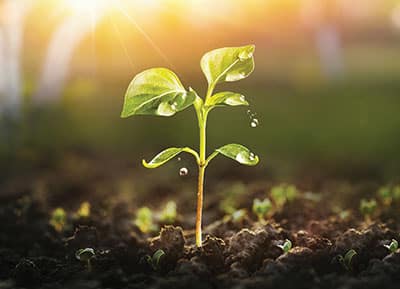
Brother Joseph Michael Fino has also been surrounding himself with plant life. During the lockdown, he took up gardening. “I’m hearing there was this thing about COVID projects, and I didn’t know that was a thing,” Fino said with a laugh, “but I guess I had one.”
Brother Fino transformed the friary’s backyard — “it was kind of a dump,” — into a small Eden of corn, tomatoes and sunflowers.
Brother Fino discovered a whole relational aspect he hadn’t expected in his garden. “It surprised me — plants are living things. They do respond,” he said.
In a year in which the natural world seemed set against human thriving, there’s something healing about gardening, caring for the earth. “In a way, you’re kind of taming it,” Brother Fino said.
The human vocation to subdue the earth (cf. Gn 1:28) might be best understood as this loving taming, as the careful “augmenting” of the earth that Brother Joseph found in his priestly vocation of gardening. “I love Adam, Eden. The whole creation thing resonates with me,” Brother Fino said.
In his homilies on creation, Pope Benedict XVI wrote in “Magnificat” (Ignatius Press, 2006) that one of the key lessons of the Genesis story is the inherent, designed goodness of the world. The universe “comes from intelligence, freedom and from the beauty that is identical with love.”
Creation itself is crafted towards joy. And to be incarnate is a cause of joy. It is good to have a body. It is good to be alive. It is good to be here.
So much of the joy of the Gospel, the Good News, is that our humanity is more than our bodies. Our human life transcends the death that interrupts our existence on earth. But, on the rapidly approaching feast of Christmas, the miracle we celebrate is that to be created is to be a vessel of joy. The joy of Christmas is that divinity condescends to be bound within a small human body.
Bonnie Grubbs, a teacher in Brooklyn, has found joy in one small body this year.
Her son, Jameson, was born on March 12. Grubbs and her husband wrestled with infertility for the past five years. When she learned she was pregnant with Jameson in June 2019, Grubbs burst into tears. “I was mad and scared and just kind of was like, ‘OK, well, here we go again, probably going to be another miscarriage.'”
But her pregnancy with Jameson was smooth and easy. And the friends with whom they shared their pain, said Grubbs, now celebrate their joy, cooing over videos and photos she shares. Grubbs said that life with Jameson, her “miracle,” has brought “about 800” small moments of joy for her this year.
One such moment came one evening, after their bedtime routine of nursing, lullaby and prayer. After they prayed the Doxology with Jameson and laid him in his crib, Grubbs started crying. “I told my husband, that moment is exactly what I knew we were missing out on all these years. It’s a little everyday thing,” she said, “But that’s why it was worth it to keep going, because I knew that was coming.”
Small eruptions of grace
“There are no events but thoughts,” continues Annie Dillard, “but the heart’s hard turning, the heart’s slow learning where to love and whom.”
Deprived of events, we have been left only with our routines. But joy is not a luxury.
Rather than punctuating our lives in bursts of celebration or communal commemorations, joy — for these three New Yorkers — was found instead in who and what our heart turns to each day. “What’s the joy right now in front of my face?” Bonnie Grubbs asked.
It’s those little moments — a sunflower tended to, a baby lulled to sleep, a look shared with a stranger on a subway — that help us see joy, even though subdued. These small eruptions of grace whisper, “This is important! Something has happened.”
Renée Darline Roden writes from New York.

